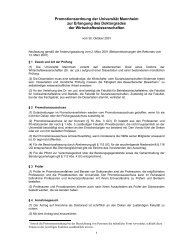The returns to cognitive and non-cognitive abilities in Germany
The returns to cognitive and non-cognitive abilities in Germany
The returns to cognitive and non-cognitive abilities in Germany
You also want an ePaper? Increase the reach of your titles
YUMPU automatically turns print PDFs into web optimized ePapers that Google loves.
where y i is <strong>in</strong>dividual i’s gross hourly wage, x i is a vec<strong>to</strong>r of <strong>in</strong>dividual characteristics<br />
assumed <strong>to</strong> be related <strong>to</strong> earn<strong>in</strong>gs, c i is the vec<strong>to</strong>r that <strong>in</strong>cludes the respondent’s personality<br />
trait s<strong>and</strong> <strong>in</strong>telligence test scores, β <strong>and</strong> γ are the correspond<strong>in</strong>g parameter vec<strong>to</strong>rs <strong>to</strong> be<br />
estimated, <strong>and</strong> u i denotes the idiosyncratic error term. S<strong>in</strong>ce wages are observable only for<br />
employed <strong>in</strong>dividuals, we account for sample selection bias us<strong>in</strong>g Heckman’s correction<br />
procedure (Heckman, 1979). 11<br />
Problems <strong>and</strong> solutions<br />
<strong>The</strong>re are a range of potentially problematic aspects that are taken <strong>in</strong><strong>to</strong> account as<br />
follows: first, the relationship between personality <strong>and</strong> earn<strong>in</strong>gs might be endogenous. While<br />
previous research suggests that an <strong>in</strong>dividual’s personality is partially <strong>in</strong>herited (Jang et al.,<br />
1996) <strong>and</strong> fairly stable for adults (Costa <strong>and</strong> McCrae, 1988, 1994) treat<strong>in</strong>g personality traits<br />
as exogenous may be mislead<strong>in</strong>g. Heckman et al. (2006) for example show for a sample of<br />
young <strong>in</strong>dividuals that parental background <strong>and</strong> the school<strong>in</strong>g level at the date of the test<br />
may affect test scores of both <strong>cognitive</strong> <strong>and</strong> <strong>non</strong>-<strong>cognitive</strong> <strong>abilities</strong>. Furthermore, while<br />
Costa <strong>and</strong> McCrae (1988, 1994) suggest that personality traits s<strong>to</strong>p chang<strong>in</strong>g at age 30,<br />
recent research by Srivastava et al. (2003) show that an <strong>in</strong>dividual’s (social <strong>and</strong> job)<br />
environment affects personality traits also <strong>in</strong> early <strong>and</strong> middle adulthood which is also<br />
po<strong>in</strong>ted out by Borghans et al. (2008). In the context of earn<strong>in</strong>gs it may well be the case that<br />
there is a feedback of either low or high earn<strong>in</strong>gs on personality which then aga<strong>in</strong> may affect<br />
earn<strong>in</strong>gs through productivity differences by personality dimension. Consequently, empirical<br />
research that attempts <strong>to</strong> exam<strong>in</strong>e causal effects of personality on labor market outcomes has<br />
<strong>to</strong> deal with the issue of reverse causality.<br />
In the present paper <strong>and</strong> similar <strong>to</strong> Semyk<strong>in</strong>a <strong>and</strong> L<strong>in</strong>z (2007), the possible<br />
endogeneity of personality <strong>and</strong> school<strong>in</strong>g should not matter much, s<strong>in</strong>ce the respondents’<br />
15















